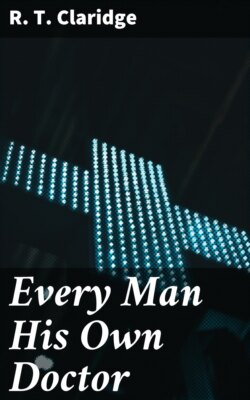Читать книгу Every Man His Own Doctor - R. T. Claridge - Страница 13
VII.—The Lancet.
ОглавлениеThe use of the Lancet is a subject that ought to interest every friend to humanity in an especial manner. By this, our mortal foe, more have fallen than by the sword. The use of one is as unjustifiable as the other. “Blood is the life,” this is the language of holy writ; he who sheds that, deprives us of a part of our existence.
“The use of the Lancet,” says Dr. Dickson, “was the invention of an unenlightened, possibly a sanguinary age; and its continued use says but little for the after-discoveries of ages, or for the boasted progress of medical science.
“Will the men who thus lovingly pour out the blood, dispute its importance in the animal economy? Will they deny that it forms the basis of the solids,—that when the body has been wasted by long diseases, it is by the blood only it can recover its healthy volume and appearance?
“Misguided by theory, man, presumptuous man, has dared to divide what God, as a part of creation, has united; to open what the Eternal, in the wisdom of his omniscience made entire.
“It is on the face of it a most unnatural proceeding. How can you withdraw blood from one organ without depriving every other of the material of its healthy state?
“The first resource of the surgeon is the lancet. The first thing he thinks of, when called to an accident, is how he can most quickly open the flood-gates of the heart, to pour out the stream of an already enfeebled existence.”
Capt. Owen, in detailing the mortality which took place among his people on the coast of Africa, by yellow fever, says, “he had not one instance of perfect recovery after a liberal application of the lancet. And in the subsequent report of the Select Committee on the Western Coast of Africa, there occurs the following passage. “The bleeding system has fortunately gone out of fashion; and the frightful mortality that attended its practice, is now no longer known on board our ships.”
“Let the reader,” says Dr. Gibbs, in his letters from Gräfenberg, “enter the crowded hospitals in England or the Continent, and see how mercilessly the lancet, the leech, and cupping-glass are employed in the diseases of the poor. Look at the pale and ghastly faces of the inmates.”
Among the numerous diseases which bleeding can produce, Darwin says, a paroxysm of gout is liable to recur. John Hunter mentions lock-jaw and dropsy; Travers, blindness and palsy; Marshall Hall, mania; Blundell, dysentery; Broussais, fever and convulsion. “When an animal loses a considerable quantity of blood,” says John Hunter, “the heart increases in frequency of strokes, as also in its violence.” Yet these are the indications for which professors bleed. Magendie mentions pneumonia as having been produced by it; and further tells us, that he has witnessed among its effects “the entire train of inflammatory phenomena;” and mark, he adds the extraordinary fact, “that this inflammation will have been produced by the very agent chiefly used to combat it.” We read in scripture, “He that sheddeth man’s blood, by man shall his blood be shed.” It has ever been supposed, that this applied to the assassin; but holy writ is deeper than this! and no doubt the time will come, when one man will no more think of bleeding another, than he would of committing any other act that should expose him to public ignominy.
The operation of blood-letting is so associated in the minds of most men with the practice of physic, that when a sensible German physician, some time ago, petitioned the king of Prussia to make the employment of the lancet penal, he was laughed at from one end of Europe to the other.
“The imputation of novelty,” says Locke, “is a terrible charge against those who judge of men’s heads as they do of their perukes, by the fashion; and can allow none to be right, but the received doctrine.” Thus Hydropathy, like many other valuable discoveries, and even Christianity itself, must wait its time; a circumstance much to be lamented—because all that is sought by bleeding is effected without this soul-harrowing process. Let such as doubt the fact, go to Gräfenberg, there they will learn that during the whole course of Mr. Priessnitz’s practice, not a single drop of human blood has been spilt; and yet all diseases for which the lancet is applied are hourly relieved. This is a fact so notorious, that no pen has ever been raised to deny it; so long as interest governs prejudice, practitioners may continue their destructive practice with impunity; but where are the feelings? As observed by a writer, “what a long dream of false security have mankind been dreaming! They have laid themselves down on the laps of their medical Mentors, they have slept a long sleep; while these, like the fabled vampire of the poet, taking advantage of a dark night of barbarism and ignorance, have thought it no sin to rob them of their life’s blood, during the profoundness of their slumber.”
Dr. Kitto, in his clever work on consumption says;—“On the subject of bleeding, purgatives, mercury, and a low course of diet, I shall have occasion to show, in the course of my observations, that these agents are not only unnecessary, but actually mischievous, particularly bleeding, which has proved more fatal than the pestilence or the sword. Nature is our best and surest guide; and if we would follow only her admonitions, we should not so frequently have to witness the impotence of our efforts to alleviate suffering; or to mourn the unfortunate results of cases, which, despite the boasted improvements in the healing art, but too frequently terminate in the grave.”
